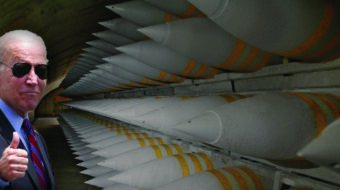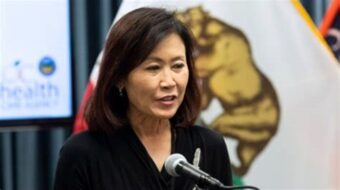
The words “Jerusalem is and will remain the capital of Israel” were in the 2008 Democratic Party platform but not, at first, in this year’s text. On Wednesday the Democratic National Convention in Charlotte, N.C., put those words back into the 2012 platform, reportedly at the request of President Obama.
The idea evidently was to blunt Republican efforts to exploit the issue to attract Jewish voters – who could provide key votes in states like Florida. The assumption apparently is that Jewish voters single-mindedly vote for those who “support Israel” no matter what (an assumption belied by current polls and the 2008 results).
The Romney campaign declared that “Mitt Romney has consistently stated his belief that Jerusalem is the capital of Israel.” A Romney spokesperson said, “Now is the time for President Obama to state in unequivocal terms whether or not he believes Jerusalem is Israel’s capital.”
However, the issue of Jerusalem is really not about whether or not Israel has its capital there.
Jerusalem contains religious sites holy to three great religions: Judaism, Christianity and Islam. The United Nations originally envisioned Jerusalem as a separate UN-administered international entity, alongside two states, Israel and Palestine. But following the 1948 Israeli-Arab war, the 1949 armistice agreements divided Jerusalem, placing West Jerusalem under Israeli control and East Jerusalem under Jordanian control – this was before the birth of the organized Palestinian liberation movement. At the time Israel said nevertheless that Jerusalem was an inseparable part of Israel.
As a result of the 1967 “Six-Day War,” Israel occupied the Palestinian West Bank of the Jordan River, including East Jerusalem. Israel unilaterally annexed East Jerusalem, and in 1980 officially declared the entire city its “eternal and indivisible” capital. Israel’s Parliament – the Knesset – and its presidential, legislative, judicial and administrative offices are now all located in Jerusalem.
The Palestinians, in their struggle to establish a Palestinian state as a part of a two-state solution to the conflict there, say that East Jerusalem will be the capital of the state of Palestine.
The United Nations has never accepted either the 1949 division of Jerusalem or the Israeli annexation. Instead, it has repeatedly said that the status of Jerusalem must be resolved by the two sides in negotiations. That point is a key part of both the Arab Peace Initiative and the “Road Map” for peace endorsed by the U.S., European Union, Russia and the UN, known as the Quartet. The U.S. has, over several administrations, Republican and Democratic, including both the Bush and Obama administrations, also taken this position. Like other countries, the U.S. continues to have its embassy in Tel Aviv.
Ultimately, however, the UN, Palestinians and the international community, including many Jews, see Jerusalem as likely becoming the capital of both Israel and the new state of Palestine – the Israeli capital in West Jerusalem and the Palestinian capital in East Jerusalem.
In 2009, United Nations Secretary-General Ban Ki-moon told the Jerusalem International Forum that Jerusalem must be the capital of two states – Israel and Palestine – living side by side in peace and security, with arrangements for the holy sites acceptable to all, if peace in the Middle East is to be achieved.
“This is the road to the fulfilment of both the vision of [United Nations] Security Council resolutions and the Arab Peace Initiative, and the yearning for peace of people from all over the world,” he said in a message to the forum meeting in Rabat, Morocco.
Ban also stressed that the international community does not recognize Israel’s annexation of East Jerusalem, and cited as obstacles to peace the continued Israeli evictions and house demolitions in East Jerusalem, closure of Palestinian institutions there, and the expansion of settlements contrary to international law and the Road Map peace plan.
“I reiterate the repeated calls of the Quartet and the wider international community for Israel to freeze settlement activity, cease provocative and unilateral actions, and reopen Palestinian institutions in Jerusalem,” the UN head said.
Successive U.S. administrations, Republican and Democratic, have to varying degrees urged Israel to stop its provocative actions in East Jerusalem so as to encourage negotiations, but pressure to back off such efforts has been strong from the right both here and in Israel.
That pressure was obvious in the revised wording of the Democratic platform. It now straddles two or more positions: “Jerusalem is and will remain the capital of Israel. The parties have agreed that Jerusalem is a matter for final status negotiations. It should remain an undivided city accessible to people of all faiths.”
Meanwhile, Romney is backed by so-called Christian Zionists who support a messianic view of Israel taking over the whole of Biblical Palestine.
The Republican effort to make a political football out of Jerusalem, and the revision of the Democratic platform in response, have little real substance.
The real issue is that the U.S. must make a meaningful push for negotiations that establish a viable Palestinian state alongside Israel. The status of Jerusalem can only be resolved in that context.
Photo: A camel poses for tourists on East Jerusalem’s Mount of Olives, overlooking the city. In the distance is the golden Dome of the Rock, a historic Islamic sacred site in Jerusalem’s Old City. Susan Webb/PW

MOST POPULAR TODAY

High Court essentially bans demonstrations, freedom of assembly in Deep South

U.S. imperialism’s ‘ironclad’ support for Israel increases fascist danger at home

Resource wars rage in eastern Congo, but U.S. capitalism only sees investment opportunity


UN warns that Israel is still blocking humanitarian aid to Gaza






Comments